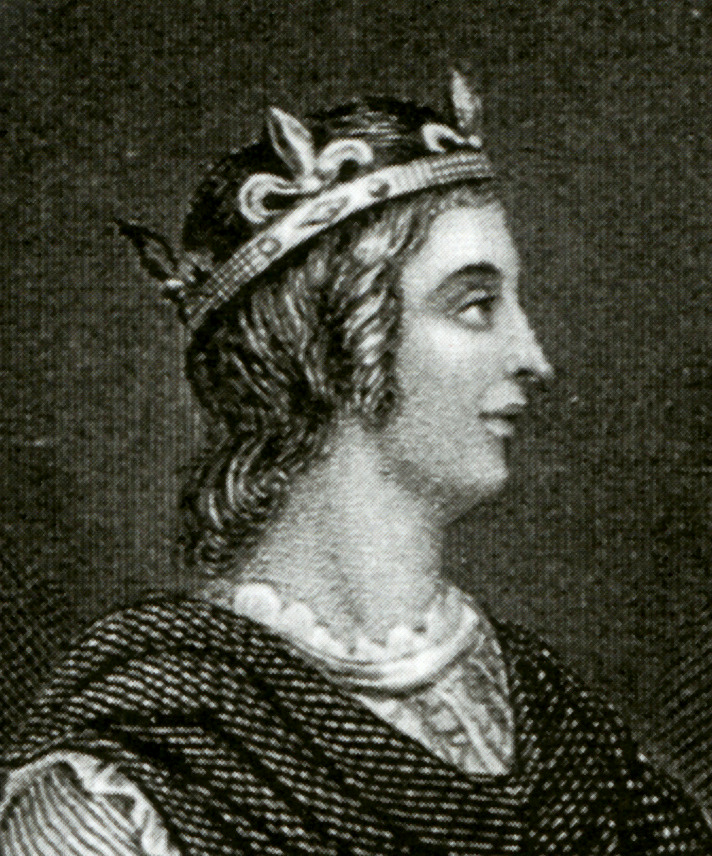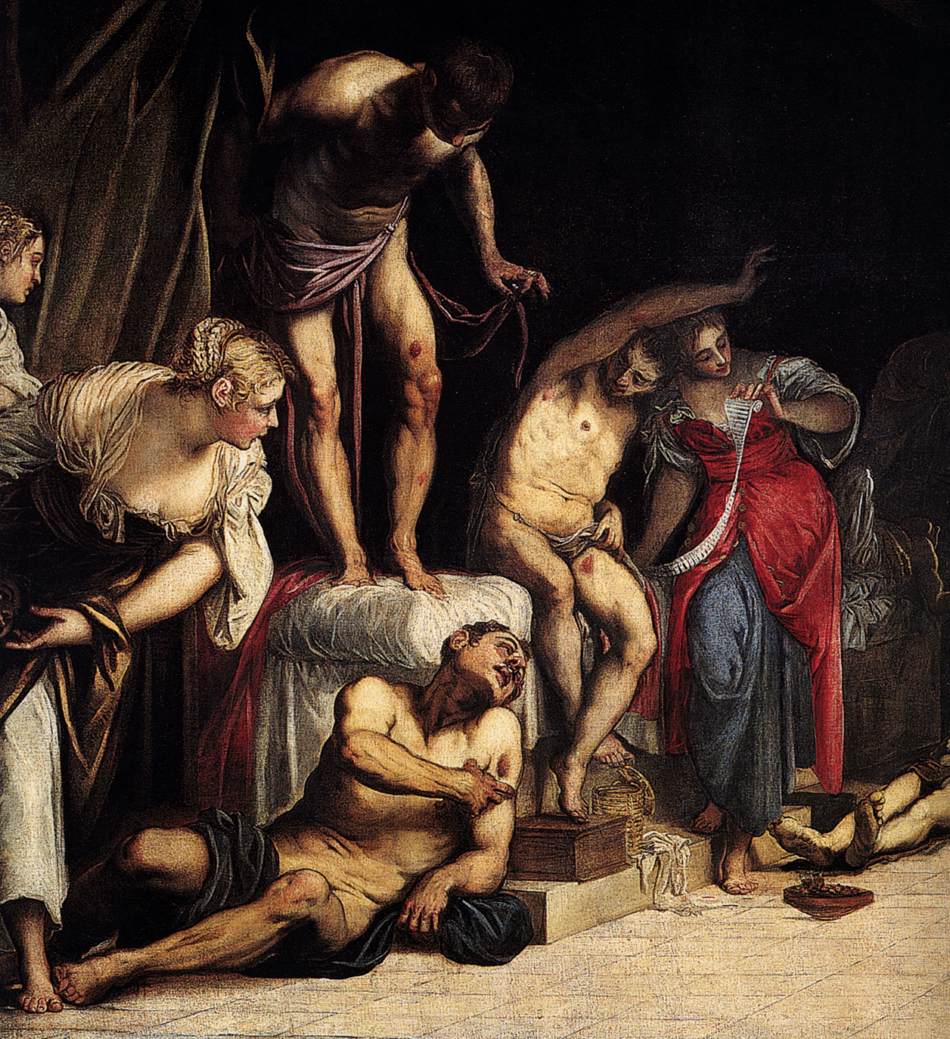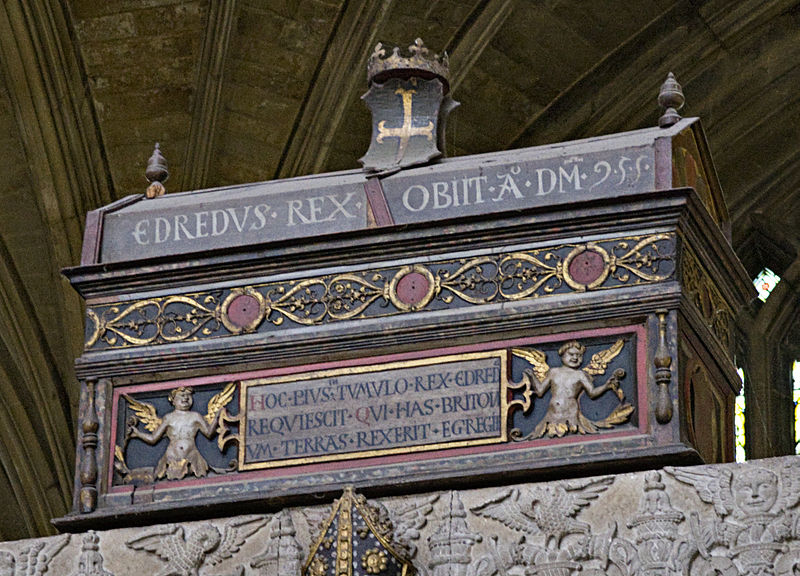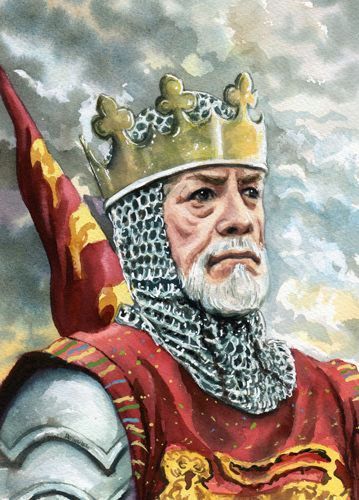Name: King Edwy (Eadwig)
Born: c.940
Parents: Edmund and Elgiva
Relation to Elizabeth II: 29th great-granduncle
House of: Wessex
Ascended to the throne: November 23, 955
Crowned: January 26, 956 at Kingston-upon-Thames, aged c.15
Married: Ælgifu
Children: None
Died: October 1, 959 at Gloucester
Buried at: Gloucester
Reigned for: 3 years, 10 months, and 7 days
Succeeded by: his brother Edgar
Eadwig, more rarely Edwy (941? – 1 October 959), sometimes nicknamed All-Fair or the Fair, was King of England from 955 until his death four years later. The eldest son of King Edmund and Ælfgifu of Shaftesbury, Eadwig was chosen by the nobility to succeed his uncle Eadred as King. His short reign was marked by ongoing conflicts with his family, thegns, and especially the Church, under the leadership of Saint Dunstan and Archbishop Odo.
Eadwig reportedly murdered by Canute. Historians have not treated Eadwig well, and it is unfortunate for him that he ran afoul of the influential Bishop Dunstan early in his reign. Legend has it that his coronation had to be delayed while Dunstan dislodged him from a bed where he was lying between his sweetheart and her equally amorous Mother.
Dunstan was, after that incident, never exactly a favourite of Eadwig’s, and it may be fair to say that Eadwig even hated Dunstan, for he apparently exiled him soon after this. Eadwig went on to marry Ælgifu, the girl with whom he was keeping company at the time of Dunstan’s intrusion. For her part, ” the strumpet” was eventually referred to as among “the most illustrious of women”, and Eadwig, in his short reign, was generous in making grants to the church and other religious institutions. He died when he was barely 20.
The fifteen year old Edwy, or Eadwig, the eldest son of the former King Edmund the Elder and St. Elgiva of Shaftesbury, succeeded his uncle Edred to the throne of England in the year 955.
Edwy was reputed to be an extremely good-looking youth and is remembered for preferring the charms of the fair lady Elgifu’s bedroom to his seat in the council chamber. St. Dunstan, angered by the King’s neglect of duty, dragged him back. Edwy was never to forgive this assault on his royal dignity and thereafter detested Dunstan.
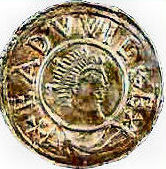 Edwy later married Elfgifu, who was a descendant of Ethelred I and the sister of Ethelweard the Chronicler, but it seems that his attraction for the lady only lead him into more trouble, she was said to be the daughter of his former mistress and step-mother, Ethelgiva.
Edwy later married Elfgifu, who was a descendant of Ethelred I and the sister of Ethelweard the Chronicler, but it seems that his attraction for the lady only lead him into more trouble, she was said to be the daughter of his former mistress and step-mother, Ethelgiva.
The marriage was considered uncanonical by the church and he was made to banish her from the court by Archbishop Odo who imposed this separation on the couple on the grounds that they were too closely related. Ethelweard the Chronicler described himself as the “grandson’s grandson” of King Ethelred I, who was the older brother of Alfred the Great. Edwy was the great-grandson of King Alfred the Great. Edwy and Elfgifu were therefore third cousins once removed. The Church at the time regarded any union within nine degrees of consanguinity as incestuous.
The fires of the King’s active dislike for Dunstan were fuelled by the vindictive Elgifu. Dunstan retired to his cloister, but the monk’s abbey was plundered by the King’s forces. Dunstan fled for his life, though hotly pursued, he managed to reach the continent where he took up residence at a monastery at Ghent, wisely remaining there for the rest of Edwy’s short reign. This naturally did not endear Edwy to the church.
Edwy, never a particularly pleasant character, was rash and profligate. The King shamefully stripped his grandmother, Edgiva, (the widow of King Edward the Elder ) of all her possessions and seems to have made himself further unpopular by enforcing unpopular high taxes and displaying a preference for Wessex over the other provinces he ruled.
Judging from the large number of charters granted in his reign, Edwy appears to have been lavish in the granting of privileges.
The Mercians and Northumbrians, frustrated at Edwy’s policies, rose in rebellion. The rebels were lead by his brother Edgar and Archbishop Odo of Canterbury, to whom the King had displayed an active dislike. Edwy met them at Gloucester but was defeated and forced to flee. Elgiva was branded and tortured, badly scaring her face, she died shortly after. A meeting was arranged by the men of Kent and Wessex, to sue for peace. In the ensueing negotiations, the Witan forced Edwy to accept his brother, Edgar as King of all the area north of the Thames.
Feud with Dunstan
According to one legend, the feud with Dunstan began on the day of Eadwig’s consecration, when he failed to attend a meeting of nobles. When Dunstan eventually found the young monarch, he was cavorting with a noblewoman named Æthelgifu and refused to return with the bishop. Infuriated by this, Dunstan dragged Eadwig back and forced him to renounce the girl as a “strumpet”.
Later realizing that he had provoked the king, Dunstan fled to the apparent sanctuary of his cloister, but Eadwig, incited by Æthelgifu, followed him and plundered the monastery. Though Dunstan managed to escape, he refused to return to England until after Eadwig’s death. The contemporary record of the Anglo-Saxon Chronicle reports Eadwig’s accession and Dunstan fleeing England – but does not explain why Dunstan fled. Thus this report of a feud between Eadwig and Dunstan could either have been based on a true incident of a political quarrel for power between a young king and powerful church officials who wished to control the king and who later spread this legend to blacken his reputation, or it could be an urban legend; the Chronicle also tells of Odo putting aside the King’s marriage on the grounds Eadwig and his wife were “too related”.
The account of the quarrel with Dunstan and Cynesige, bishop of Lichfield at the coronation feast is recorded in the Anglo-Saxon Chronicle and in the later chronicle of John of Worcester and was written by monks supportive of Dunstan’s position. The “cavorting” in question consisted of Eadwig (then only 16) being away from the feast with Ælfgifu and her mother Æthelgifu. He later married Ælfgifu, who seems to have been the sister of Æthelweard the Chronicler.
Æthelweard describes himself as the “grandson’s grandson” of King Æthelred I. Eadwig was the son of King Edmund the Magnificent, grandson of King Edward the Elder, great-grandson of King Alfred the Great, and therefore great-great-nephew of King Æthelred I. Eadwig and Ælfgifu were therefore third cousins once removed.
Division of the Kingdom
Dunstan, whilst in exile became influenced by the Benedictines of Flanders and a pro-Dunstan, pro-Benedictine party began to form around Athelstan Half-King’s domain of East Anglia supporting Eadwig’s younger brother Edgar. Frustrated by the king’s impositions and supported by Archbishop Odo, the Thanes of Mercia and Northumbria switched their allegiance to Eadwig’s brother Edgar. In 957 rather than see the country descend into civil war, an agreement was reached among the nobles by which the kingdom would be divided along the Thames, with Eadwig keeping Wessex and Kent in the south and Edgar ruling in the north.
Gifts of Land
Eadwig is known for his remarkable generosity in giving away land. In 956 alone, his sixty odd gifts of land make up around 5% of all genuine Anglo-Saxon charters. No known ruler in Europe matched that yearly total before the twelfth century, and his cessions are plausibly attributed to political insecurity.
Death
Edwy died young in unknown circumstances on 1st October, 959, after only a four year reign, he was possibly murdered. Edwy was never particularly popular and was not greatly mourned by his subjects. He was succeeded by his brother Edgar the Peaceful, who reunited the kingdom
| Timeline for King Edwy (Eadwig) |
| 955 | Edwy crowned at Kingston-upon-Thames |
| 956 | Dunstan sent into exile by Edwy |
| 957 | Mercians and Northumbrians rebel against Edwy |
| 959 | Edwy dies in Gloucester |
Credits:
http://www.britroyals.com/
http://www.englishmonarchs.co.uk/
Wikipedia

